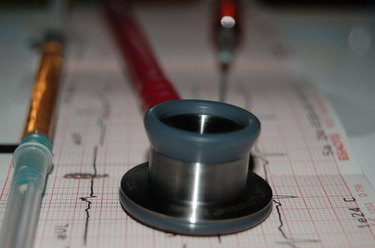
A normal heart beats at a rate from 60 to 100 times a minute, according to the Heart Rhythm Society website. Your heart rate can increase to 160 to 180 or more beats per minute during intense exercise. Variations in diet, medication, activity and age all affect heart rate. When the heart races for no apparent reason, however, it could indicate an abnormality.
Tachycardia
Video of the Day
An abnormally rapid heart rate of more than 100 beats per minute is a condition known as tachycardia. Tachycardia occurs when there is a problem with the heart's electrical system, which flows from the upper to lower heart chambers and triggers the heartbeat.
Video of the Day
Supraventricular Tachycardia
Tachycardia that originates in the upper chamber is supraventricular tachycardia, or SVT. SVT is usually not serious. However, frequent recurrences can weaken the heart muscle over time.
Ventricular Tachycardia
Ventricular tachycardia, or VT, originates in the lower chambers or ventricles of the heart and is a more serious and potentially life-threatening type of tachycardia. Prolonged VT can lead to a severely rapid and irregular ventricular beat, known as ventricular fibrillation. Ventricular fibrillation is the most common cause of cardiac arrest.
Symptoms
Common symptoms of tachycardia include blurred vision, chest discomfort, shortness of breath, lightheadedness/dizziness, feelings of faintness or fainting. Any sudden rapid heartbeat should immediately be checked out by a doctor. You should call 911 for emergency medical attention if you experience a rapid heartbeat accompanied by chest pain or fainting.
Panic/Anxiety Attack
Rapid heartbeats are a common symptom of panic or anxiety attacks. According to the Helpguide website, a panic or anxiety attack is a sudden, overwhelming sense of anxiety and fear. Your heart starts pounding, and you may experience some symptoms similar to those of tachycardia, i.e. dizziness, chest discomfort and shortness of breath. Panic attacks are usually triggered by a severely stressful event, such as a divorce or job loss, or a life transition, such as getting married or starting a new job. Medical conditions, such as hypoglycemia or hyperthyroidism, can also cause panic attacks. If panic or anxiety attacks are frequent, you should see your doctor to rule out any physical causes and determine a course of treatment for your anxiety.
Diagnosis/Treatment
If panic or anxiety is not causing your rapid heartbeat, a consultation with a heart specialist will help identify the type of tachycardia you have and your treatment options. The specialist may perform an electrocardiogram, or EKG, a recording of your heart rhythms known as a Holter monitor and an electrophysiology study. He may also ask about your heart rhythm pattern, pulse rate, and the time, frequency and duration of your episodes. SVT may be treated with medication or catheter ablation. Catheter ablation combined with an implantable cardioverter defibrillator, or ICD, may be performed to treat VT.